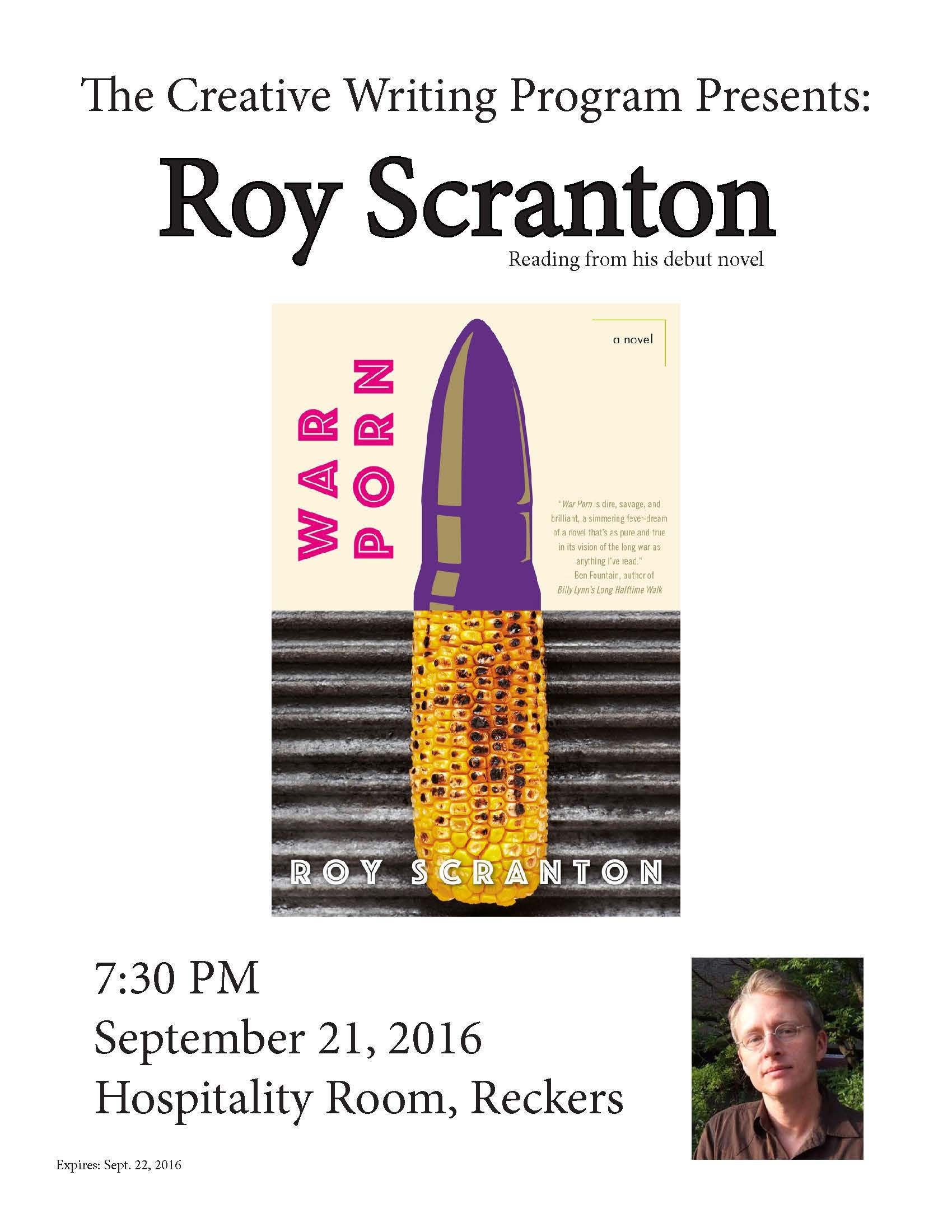Introductions are often bland and full of unintended egotisms. How do I start this blog? Hi. My name is Daniel Tharp. I am a student attending the MFA Creative Writing Program at the University of Notre Dame, but that doesn’t seem right, too stuffy, too formal. With that kind of introduction you miss the important facts like how I sold coney dogs at local craft shows and could tell you the difference between a “Flint” and a “Detroit,” how I worked at Taco Bell for five years and learned the Art of burrito folding and how much a soft taco should weigh before a customer takes the first bite, how I could tell you that at Lowes, a department manager has the ability to lower the price of merchandise by ten percent for a variety of reasons, how I could tell you what gauge of wire you need to run power to your RV and how to add a hot tub right next to it. That sounds more like me, but enough of that.
Roy Scranton will be reading from his debut novel, War Porn, on Wednesday, September 21, 2016, at the Hospitality Room of Reckers on Notre Dame’s Campus. The reading begins at 7:30 PM, and is free and open to the public.
He is the author of “Learning to Die in the Anthropocene: Reflections on the End of a Civilization” (City Lights, 2015) and the novel War Porn (Soho Press, 2016). His essays, journalism, short fiction, and reviews have appeared widely. In addition, he co-edited Fire and Forget: Short Stories from the Long War (Da Capo, 2013). Scranton’s New York Times essay “Learning How to Die in the Anthropocene” was selected for The Best American Science and Nature Writing 2014, and his essay “The Terror of the New” was selected as a notable essay in Best American Essays 2015. He was the recipient of a Mrs. Giles G. Whiting Fellowship in the Humanities (2014–2015), won the Theresa A. White Literary Award for short fiction (2009), and was a post-doctoral fellow at the Center for Energy and Environmental Research in the Human Sciences at Rice University (2016). Currently, he teaches creative writing at the University of Notre Dame.
Scranton’s debut novel, War Porn, has been described by the Wall Street Journal as, “One of the best and most disturbing war novels in years.” The words “disturbing” and “brutal” have surfaced in many of the reviews of War Porn. Perhaps, this assertion comes because in his novel Scranton holds nothing back, while North American society seems to have a one track mind on the image of a war hero, reminiscent of “The Soldier,” by Rupert Brooke. Scranton has admitted that by all accounts the novel was completed in 2011, but because of societal constructs around the image of American soldiers, publication during that time was out of the question. Through this lens, Scranton’s novel is akin to “Dulce et Decorum Est,” by Wilfred Owen, and the uneasy feeling that most reviewers have is not directed at the reality that Scranton portrays on the page but at the juxtaposition of a reality based on firsthand experience vs. the imagery of an ideology. In War Porn, the characters seem to implore that there is no utopian war, there is no utopian soldier. There is only war and its effects on humanity.
Roy Scranton’s reading on September 21st will surely be interesting, and more than that it will open the door for the audience to not only question him as a writer and as a veteran, but also open the door for them to ask themselves what it means to exist in a world bombarded with war porn.
